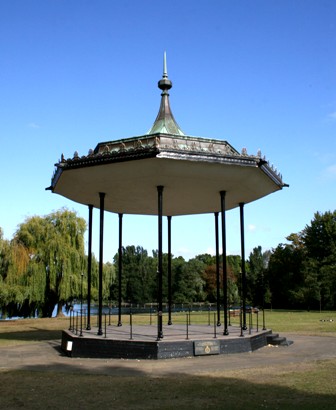
A park, earlier today. Go while you still can.
Edition number 56; dateline 2 October 2012
Who will speak for leisure?
It is a favourite refrain of the managing editor of The Leisure Review that a good idea doesn’t care who has it, a phrase that I have always taken to mean that we should endeavour to focus on the outcome rather than the process or that I am talking too much.
The former interpretation sprung to mind when I was reading the article in this issue about RAPS, the register for aquatic professionals that has been recently launched and is likely to have a significant impact upon the teaching of swimming. It will not come as a surprise to learn that RAPS is closely based on REPS, the register for exercise professionals that has had a transformative effect upon training standards within the fitness sector. REPS is a classic example of a good idea successfully delivered and it is entirely sensible that the model should have been replicated within the learn-to-swim sector. It is not entirely fanciful to suggest, as some did when REPS was first established, that it offered a model that could be applied more widely across the sport, leisure and culture sector to create and sustain momentum for professional management standards. Such a system may well have proved a better investment for a cross-sectoral professional body seeking to establish its bona fides than an elaborate chase to add an initial C to its logo in the vain hope that this would bring some credibility. This was too much to hope for, illustrating admirably that while a good idea may not care who had it, there does need to be someone with the intelligence to recognise that it is actually a good idea.
Having been pleased to welcome RAPS as a good idea revisited, I was rather less thrilled to see another good idea from the relatively recent past heaving itself into view. It seems that we are in need of another campaign for parks. It could be argued that the 1990s version of this campaign was one of the leisure sector’s most cohesive and effective lobbying initiatives, bringing together a wide range of organisations and individuals in the interests of one of the nation’s greatest assets, its extensive network of public parks. That a new campaign has been deemed necessary so soon is particulalry regrettable given that all the arguments made during the last campaign still hold true in their entirety today. That such a campaign is necessary only two years into this parliament is also indicative of the current administration’s approach to the concept of the greater public good. Nothing embodies the concept of community and equity better than our parks and nothing serves to illustrate the government’s contempt for the greater part of the nation it is supposed to represent more clearly than their neglect.
Writing a summary of the new campaign for this issue of The Leisure Review served as a brief reminder of the work undertaken by the Institute for Leisure and Amenity Management (ILAM), the organisation for which I worked at the time and for which the campaign for parks might be said to have represented a high-water mark. While the demise of ILAM may be only lightly lamented, the fact that this new campaign for parks has been conceived and promoted by Horticulture Week, a magazine that would no doubt see its role as that of reporting on policy in the green space sector rather than initiating it, should give cause for concern within the wider leisure sector. It has long been argued within the pages of The Leisure Review, not least on this page, that parks are central to sport, leisure and culture however one chooses to define them individually or it collectively. The vast majority of the principles of service provision and the minutiae of management, development and promotion of facilities and opportunities across the sport, leisure and culture sector are as applicable to a park as they are to a gallery, as relevant to museum as they are to a tennis court. While the neglect of parks may well be indicative of a failure to understand the role and importance of leisure in all its forms to the greater public good, that it takes a specialist title to reanimate a campaign in their defence is indicative of the lamentable state of leadership within the wider leisure sector. As this issue of The Leisure Review takes shape we are in the middle of the political parties’ conference season in the middle (or so the coalition hopes) of a parliament in which the fundamental concepts of public service, the common good and the public realm are being questioned and challenged with a fervour not seen for a generation. When so many questions are being asked and so many answers are available, who is speaking for leisure?
Jonathan Ives
Editor
letter from the editor
The Leisure Review editorial
